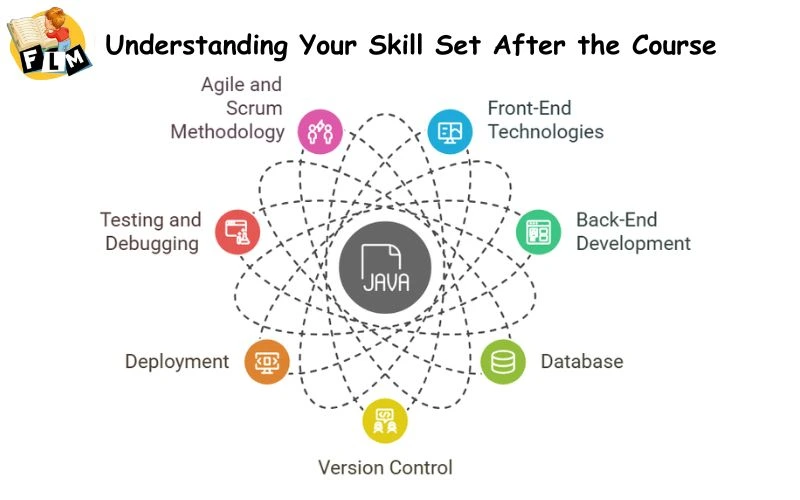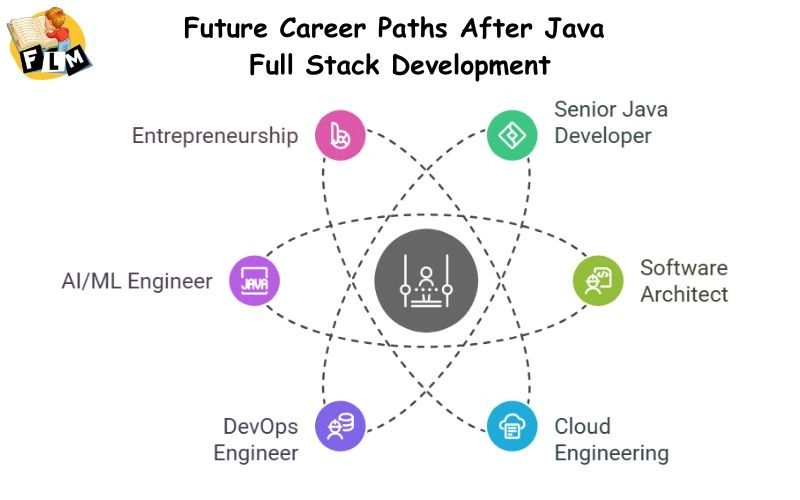Completing a Java Full Stack course is an important achievement, but the journey does not stop there. The actual challenge begins when you step into the professional world and start implementing what you have learned. Understanding the Next Steps After the Java Course can help you from learning to work efficiently. Whether you have to do your first job, build projects, or continue expanding your knowledge, you have to be successful by having a clear roadmap. In this blog, we will detect various routes that you can take after completing your Java Full Stack course, which will help you maximize your potential and career opportunities.
Understanding Your Skill Set After the Course

Before proceeding forward, it is important to assess what you have learned and how well you can apply those skills to the real -world scenarios. A Java Full Stack course is usually included:
- Front-End Technologies: HTML, CSS, JavaScript, React or Angular.
- Back-End Development: Java, Spring Boot, Rest APIs.
- Database: MySQL, MongoDB.
- Version Control: Git, GitHub.
- Deployment: Docker, Kubernetes, AWS, or other cloud services.
- Testing and Debugging: Unit tests, integration tests and debugging techniques.
- Agile and Scrum Methodology: Understanding how modern development teams work collaborated.
Next Steps After Java Course: What to Do Now?
Build Real-World Projects
One of the best ways to strengthen your learning is to build real-world projects. This helps you get practical experience and makes your resume stand out.
Project Ideas Suggested:
- E-commerce Website: Create a completely functional online store using Java, Spring Boot, Reacts and a database.
- Portfolio website: Perform your skills, projects and experience.
- Task Manager Application: A web app where users can create, edit and track.
- Blog Application: A platform where users can post articles, comments and posts.
- Social Media App: An original version of a networking platform with certification and real-time updates.
Work on Open Source Contributions
Contributing to open-sources projects enhances your coding skills, exposes the best practices, and helps you to network with experienced developers.
How to start?
- Explore GitHub and find Java-based open-source projects.
- Fix bugs, add features, or improve documentation.
- Connect with the open-source community by discussing issues and pulling the requests.
- Contribute to Java-based frameworks such as Spring or Hibernate.
Apply for Jobs and Internships
Once you experience hands, it is time to seek job opportunities. Java Full Stack includes some general job titles for developers:
- Junior Java Developer
- Full Stack developer
- Software Engineer
- Back-End developer
- Front-End developer (if you specialize in UI/UX)
Where to Find jobs?
- LinkedIn: Create a strong profile and connect with the recruiters.
- Job Portals: Apply to platforms such as jobs, really and glasses.
- The Company’s Website: check the career sections of technical companies for openings.
- Freelancing Websites: Get experience by working on platforms like Upwork and Fiverr.
- Internship Programs: Many companies offer internship-to-job transition programs.
Prepare for Job Interviews
Job interviews test your technical and problem solving skills. Here’s how you can prepare:
- Review Core Java Concepts: object-oriented programming, data structures and algorithms.
- Practice Coding Questions: Solve problems on LeetCode, CodeSignal and HackerRank.
- Learn System Design: Understanding architecture helps in senior level interviews.
- Mock Interview: Practice with peers or use platforms like Pramp.
- Behavior Interview: Prepare an answer for general human resource questions using Star method.
Enhance Your Knowledge with Advanced Topics
After mastering the basics, learning advanced subjects can give you an edge over other candidates.
Advanced Topic Recommended:
- Microservices Architecture: Learn Spring Clouds and Kubernetes.
- Cloud Computing: AWS, Azure or Google Cloud.
- Safety Best Practice: Learn OWASP Safety Principles.
- DevOps Tools: Understand Docker, Jenkins and CI/CD pipelines.
- AI and machine learning Integration: Understand how Java can be used in AI-based applications.
Join Developer Communities and Network
Networking with other developers can open job opportunities and keep you updated with industry trends.
Where to Connect?
- LinkedIn Group: Java full stack development communities.
- Meetup events: Participate in tech meat and hackathon.
- Online forum: Participate in stack Overflow, Reddit, and Dev.to discussions.
- Java User Group (Jug): Java is attached to professionals worldwide.
- Technical Conference: Participate in conferences such as JavaOne and Davoxx.
Consider Freelancing or Starting a Side Project
Freelancing can help you gain real world experience and earn additional income.
Where to Find Freelance Work?
- Upwork: Great to start small projects for beginners.
- Fiverr: Ideal for offering specific Java development services.
- Toptal: Competitive platform for experienced developers.
- PeoplePerHour & Freelancer: Alternative platform to Find Freelance gigs.
Future Career Paths After Java Full Stack Development

Once you get experience as Java Full Stack Developer, you can detect various career paths:
- Senior Java Developer: Lead Projects and Mentor Junior Developers.
- Software Architect: Design Scalable and High-Performance System.
- Work on Cloud engineering: cloud-based applications and infrastructure.
- DevOps Engineer: Manage Software Deployment and Automation.
- AI/ML Engineer: Combine Java Skills with AI and data science.
- Entrepreneurship: Start your own technical business or SaaS product
Conclusion
Completing its Java full stack course is an important milestone, but the actual journey now begins. The next stages include refining your skills in the Next Steps After Java Course, and being updated with industry trends. Consider working on real-world projects, contribute to open sources, or even create your own applications to strengthen your portfolio.
Networking with experienced developers, joining technical forums and preparing job interviews will help you to transition easily into the professional world. Additionally, mastering advanced structures, cloud technologies and DevOps practices can give you a competitive edge in the job market.
Learning in the technical industry never stops. Keep searching, be curious, and take active steps to increase your expertise. The Next Steps After Java Course will define your career path, so embrace the journey with confidence and enthusiasm!
Future-Proof Your Career with FLM’s AI-Powered Java Full Stack Development!
Java Full Stack Developer Training
Learn Java, Spring Boot, React.js, SQL, and AI automation to build powerful web applications. AI is transforming software development, and companies need skilled Java full stack developers who can integrate AI-driven solutions. This 5+ month live, interactive training will help you master real-world projects, automation tools, and industry best practices.
What You’ll Gain?
- High Demand – AI Skills Give You a Competitive Edge
- Earn ₹12 LPA+ with Java Full Stack & AI Expertise
- 100% Live, Expert-Led Training
- AI-Powered Development – Automate Coding & Debugging
- 7 Major & 7 Mini Real-World Projects for Hands-On Experience
- Mock Interviews, Resume Building & Career Guidance
- Exclusive: 2-Year Recording Access for the First 100 Enrollees
- Job-Ready Curriculum with Real-World Applications
Unlock your future with FLM’s AI-Powered Java Full Stack Development
Limited Seats Only – Enroll Now!
Visit: frontlinesedutech.com | Click Here to Enroll
WhatsApp: 8333077727

